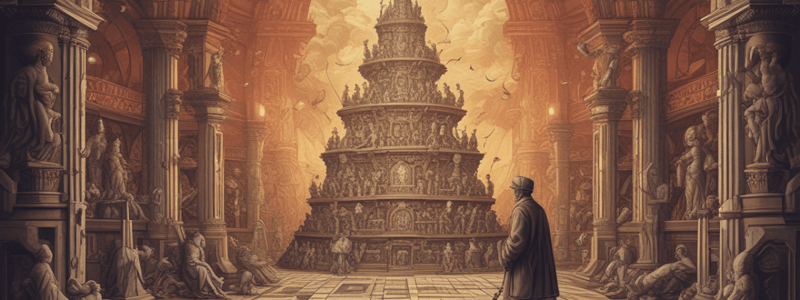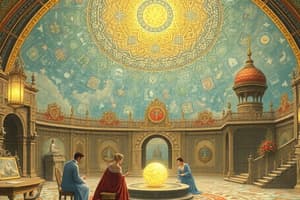Podcast
Questions and Answers
What was the Scientific Revolution?
What was the Scientific Revolution?
- A time of economic decline in Europe
- A period of significant military conquests
- A social and religious movement that restricted the spread of new ideas
- A series of major scientific discoveries accompanied by philosophical and religious changes (correct)
When did the Scientific Revolution occur?
When did the Scientific Revolution occur?
- From the mid-sixteenth century to the end of the eighteenth century
- From the early years of the thirteenth century to the end of the fourteenth century
- From the early years of the fifteenth century to the end of the seventeenth century (correct)
- From the early years of the eighteenth century to the end of the nineteenth century
What was an influence on the Scientific Revolution?
What was an influence on the Scientific Revolution?
- The Renaissance (correct)
- The Black Death
- The Crusades
- The Age of Exploration
What was the outcome of the Scientific Revolution?
What was the outcome of the Scientific Revolution?
Who were some of the key contributors to the Scientific Revolution?
Who were some of the key contributors to the Scientific Revolution?
What was the main consequence of the Reformation in the context of the Scientific Revolution?
What was the main consequence of the Reformation in the context of the Scientific Revolution?
Which of the following was a practical impact of the Scientific Revolution?
Which of the following was a practical impact of the Scientific Revolution?
What was the central idea of heliocentrism?
What was the central idea of heliocentrism?
What was the main characteristic of the mechanistic universe developed during the Scientific Revolution?
What was the main characteristic of the mechanistic universe developed during the Scientific Revolution?
What was the primary way of thinking that replaced superstitions during the Scientific Revolution?
What was the primary way of thinking that replaced superstitions during the Scientific Revolution?
Flashcards are hidden until you start studying
Study Notes
The Scientific Revolution
- A time period of major scientific discoveries, inventions, and increases in knowledge, accompanied by philosophical and religious changes.
- Debated start among scholars, but most agree it lasted until the end of the 17th century.
- Important for enabling the spread of new ideas and perspectives, and changing the structure of society.
Causes and Influences
- Persian and Indian mathematicians: expanded upon previous knowledge, created new theories and postulates, and influenced European scholars.
- Renaissance: led to new theories and advancements, with artists and inventors relying on geometric principles and mathematical ideas.
- Reformation: altered the concept of God, allowing for changes in science and encouraging the connection of religion and science.
Effects of the Scientific Revolution
- Enlightenment: encouraged changes in politics, emphasizing the natural rights of all people and the importance of Reason.
- Industrial Revolution: sparked by the ideas of the Scientific Revolution, with inventions developed and improved upon.
Practical Impacts
- Astronomy: affected by heliocentrism, the concept that the universe is centered on the Sun, with discoveries by Copernicus and Galileo.
- Deism: developed, with the central tenets expressed in Rene Descartes' questions of his own existence, and a mechanistic universe.
- Empiricism, skepticism, and logic: replaced superstitions like witchcraft, supernatural healing, and alchemy, with a focus on physical evidence and justified knowledge.
Change in Worldview
- Shift from relying on superstitions to relying on empiricism, skepticism, and logic.
- Move towards a more rational and evidence-based understanding of the world.
Studying That Suits You
Use AI to generate personalized quizzes and flashcards to suit your learning preferences.



